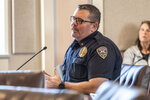
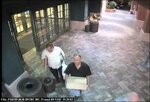
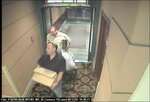

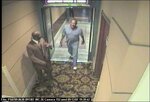
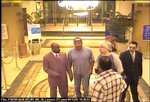
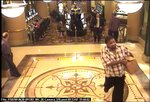
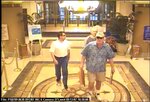

Sept. 13, 2007, was a slow night for the Las Vegas Police Department’s Robbery and Homicide Bureau. That was the only reason then-detective Andy Caldwell and his partner were out on patrol when a 911 call about a street robbery came in.
“While we’re on the call — we worked off of pagers back then — we got a page from our supervisor that said ‘hey, give me a call,” Caldwell recalled.
Caldwell’s partner made the call.
“He’s laughing and he’s saying ‘no, no, no way,” Caldwell said.
When he got off the phone, he told Caldwell, “We’ve got to go to the Palace Station. There’s a robbery that happened, and O.J. Simpson is a suspect.”
“Of course, you can imagine, you get a little bit of laughter. ‘Yeah, no, O.J. Simpson is not doing a robbery in a casino. That’s dumb,’” Caldwell recalled thinking.
Once Caldwell and his partner began their investigation at the Palace Station, it didn’t take long for them to confirm that, indeed, O.J. Simpson was a prime suspect in a robbery at the casino.
The football star and Hollywood actor ended up serving nine years in prison for charges stemming from that 2007 robbery. He had been acquitted 12 years earlier on murder charges filed after his ex-wife Nicole Brown Simpson and her friend Ronald Goldman were killed in Los Angeles in June 1994. While a separate civil case later found him liable for the deaths, he never served jail time for the crimes.
In the wake of Simpson’s death on Wednesday, April 10, Caldwell, now a commander with the Centralia Police Department, sat down with a Chronicle reporter to reflect on the case that put Simpson behind bars.
“It was different than everything I’d ever worked on … I imagine I will never work something like that again,” Caldwell said. “This wasn’t a complicated case in the investigation part. It was a complicated case to manage, for sure.”
The robbery occurred after memorabilia dealer Alfred Beardsley contacted another memorabilia dealer, Tom Riccio, about a large amount of Simpson’s family heirlooms he had in his possession.
Those heirlooms had been seized and sold following the civil trail for the murder case, Caldwell said.
“Somehow, (Simpson) gets tipped off, I don’t know how, but all his valuable property and his personal belongings get loaded up and distributed into storage lockers … in different people’s names, so he can hide his assets from the Goldmans and the Browns,” Caldwell said. “Somehow, a third party completely uninvolved in this gets ahold of one of those lockers, and he realizes that, ‘Hey, I have valuable stuff here that I can probably sell back and make money on.’”
That third party, Beardsley, set up a deal with Riccio, who was acting as a middleman for Simpson without Beardsley’s knowledge.
“It gets a little bit complex here because we have two kind of crooked individuals involved in the process (who) end up being victims,” Caldwell said.
Riccio made a deal with Simpson to get his property back to him in exchange for 200 exclusively signed copies of Simpson’s book “If I Did It,” which Simpson agreed to, Caldwell said.
“The deal is set up in Las Vegas, partly because the shady memorabilia dealer knows O.J. is coming to Vegas that weekend for a wedding,” Caldwell said.
But at the last minute, Beardsley backed out of the deal.
Riccio then “scrambles” and contacts another memorabilia dealer, Simpson’s old manager Bruce Fromong, to bring some of Simpson’s old memorabilia to the hotel room where the deal was supposed to go down, Caldwell said.
“So he loads up all kinds of memorabilia, but he figures, ‘if a big time buyer is coming, I’m not just going to bring the O.J. stuff. I’m going to bring Joe Montana, Snyder West Point, I’m going to bring Pete Rose,” Caldwell said.
Unbeknownst to the memorabilia dealers, “O.J. had no intention of going in and having a conversation,” Caldwell said. “O.J. recruited … his crew of guys, and they had guns, and they were just going to go in and take it. O.J. figured, ‘I’m just gonna get my own stuff back. There’s gonna be no issues.’”
Simpson and his crew of five “burst into the rooms, pulling guns, pushing people around,” Caldwell said. “That’s where the robbery happened. And then they held them in the room (and) moved them around the room, so it ends up being a kidnapping.”
Detectives were able to recover all of the stolen property and return it to the memorabilia dealers, Caldwell said.
The investigation itself ended up taking almost a year, primarily because public interest in the case meant they got a lot of tips that ended up being false.
“People who normally wouldn’t want to be involved in a case suddenly want their names associated with (it),” Caldwell said, adding that the group of officers who ultimately arrested Simpson “had nothing to do with the case. They just kind of went out and did it.”
Another oddity of the case was that it involved “more criminalistic folks,” Caldwell said. Most significantly, Riccio had hidden a recording device on the armoire in the hotel room that recorded the whole robbery, and didn’t tell detectives.
Caldwell and his team only found out about it when the audio was leaked to TMZ, he said.
“In my mind, he should have been arrested,” Caldwell said of Riccio, “but charging decisions are up to prosecutors, not detectives. So their decision was (that) his piece of evidence was far more valuable to them in prosecuting the case than it was to prosecute him for setting this whole thing up.”
After a year-long investigation, four full days on the stand during trial and the media “circus” surrounding it all, Caldwell and his team were keen for it to all be over, Caldwell said.
“I was done with it at the time, so I didn’t do any interviews. I didn't talk to anybody. We got requests for all kinds of stuff, but, luckily, my partner and I, we just didn’t want anything. We just wanted to be done with it,” he said.
Caldwell didn’t publicly talk about the case until about 10 years later, when his wife suggested he write a book about the investigation, “just for posterity,” he said.
Working with an agent, he ended up writing and publishing his account of the investigation, “Room 1203: O.J. Simpson’s Las Vegas Conviction,” via WildBlue Press in 2017 — the same year he left the Las Vegas Police Department after working there since 1998. The book ended up inspiring an Outpost Entertainment documentary, which Caldwell worked on for about six months in 2017.
“From the time of the conviction until deciding to write the book, I totally pushed it away, closed the door and just left it alone,” Caldwell said, adding that the process of writing the book was “kind of therapeutic, because I wrote it 10 years after the incident, so a lot of trying to remember things, going through the reports. It was good to just kind of process through everything.”
Since his retirement from the Las Vegas Police Department, Caldwell has taught classes and seminars on managing high profile investigations and even stepped away from policing for a few years. He and his family moved to Lewis County in 2018, where he served as the deputy director of Lewis County Emergency Management for about three years before he was hired as a commander with the Centralia Police Department.
While he is still able to maintain some distance from the case, Caldwell said, “It follows you wherever you go, because if you’re of maybe my generation and an older generation, it’s a big deal. O.J. Simpson, he’s an important part of our lives, and he’s an important part of pop culture.”